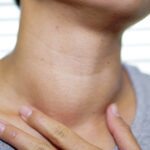Treatments, Causes, Diagnosis, and Medications for Hair Loss
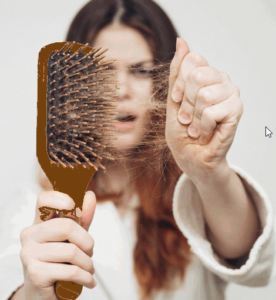
For some of us, hair loss can be a distressing event. It isn’t very comforting to find too many hair strands on your
clothes and all around your house. But don’t fret; there are specific hair loss remedies that can assist. This article is
for you if you have hair loss problems. It’s time to stop being afraid of hair loss and start looking for remedies. To
locate the best treatments, you must first figure out what is causing your hair loss. Continue reading to find out what
causes hair loss and what remedies you may apply to prevent it. You’ll also discover how to prevent hair loss and
boost hair growth with a little TLC.
Baldness is an issue that cannot be healed, but some therapies can help with hair loss by encouraging hair growth or
keeping it from falling out.
Types Of Hair Fall
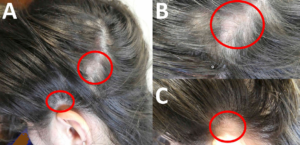
1. Androgenic Alopecia is the most frequent cause of hair loss in men and women worldwide. This genetic
disorder can be treated with drugs and surgery, and male pattern hair loss is androgenic Alopecia. In contrast,
female pattern hair loss is known as androgenic Alopecia.
2-Alopecia Areata is an autoimmune disorder in which the body’s immune system assaults the hair follicles.
Patchy hair loss occurs due to this disorder, which also hinders new hair from sprouting. This is a disorder that can
affect both adults and children. Hair loss caused by alopecia areata can occur suddenly and without warning.
People with this illness may notice that their hair is going out in tiny spots. Hair from the brows and eyelashes
s may fall out due to the illness.
3. Frontal Fibrosing Alopecia is a scarring hair loss with a pattern. It occurs at the hairline of the front scalp,
and hair does not regrow in this scenario. In some situations, hair loss in the brows occurs before hair loss on the
scalp. This type of alopecia affects men and causes hair loss on the scalp and beard.
Overview
Hair loss (alopecia) can affect just your scalp or your entire body, and it can be temporary or permanent. It can be
the result of heredity, hormonal changes, medical conditions, or a normal part of aging. Anyone can lose hair on
their head, but it’s more common in men.
Baldness typically refers to excessive hair loss from your scalp. Hereditary hair loss with age is the most common
cause of baldness. Some people prefer to let their hair loss run its course untreated and unhidden. Others may cover
it up with hairstyles, makeup, hats, or scarves. And still, others choose one of the treatments available to prevent
further hair loss or restore growth.
Before pursuing hair loss treatment, talk with your doctor about the cause of your hair loss and treatment options.
Symptoms
Hair loss can manifest itself in various ways, depending on the cause. It might strike abruptly or gradually, affecting
your entire body or just your scalp.
Signs and symptoms of hair loss may include:
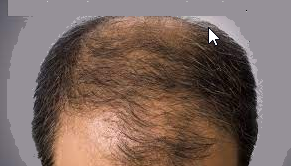
- Gradual thinning on top of the head This is the most
prevalent type of hair loss, which occurs as people become older. Hair
begins to recede near the hairline on the forehead in men. In most cases,
women’s hair has a broadening of the part. A receding hairline is an
increasingly common hair loss trend in older women (frontal fibrosing
alopecia).
Circular or patchy bald spots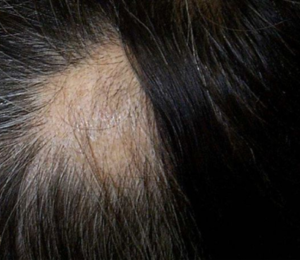 some people lose hair in circular or spotty bald
some people lose hair in circular or spotty bald
areas on the scalp, beard, and brows. Before the hair falls out, your skin may
become uncomfortable or unpleasant.
- Sudden loosening of hair Hair might loosen as a result of physical or
mental trauma. When combing or washing your hair, or even after light tugging, a
few hair strands may fall out. Hair thinning is familiar with hair loss, although it
is only temporary
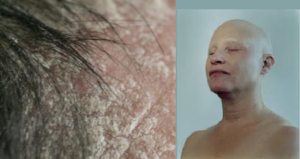 Full-body hair loss Some conditions and medical treatments,
Full-body hair loss Some conditions and medical treatments,
such as chemotherapy for cancer, which can result in hair loss in all
over your body, and the hair usually grows back.
- Patches of scaling that spread over the scalp. This is a sign
of ringworm. It may be accompanied by broken hair, redness, swelling,
and, at times, oozing.
What Are The Causes Of Hair Loss?
On average, people lose 50 to 100 hairs per day. Because new hair grows at the same time, this is usually
undetectable. Hair loss happens when the hair that has fallen out is not replaced by new hair.
One or more of the following factors are commonly linked to hair loss:
1. Hereditary
An inherited disease that occurs with aging is the most common cause of hair loss. Androgenic alopecia, often
known as male-pattern baldness or female-pattern baldness, is a disorder that affects both men and women. In men,
it manifests as a receding hairline and bald spots, whereas in women, it manifests as thinning hair along with the
crown of the head.
2-Hormonal changes and medical conditions
Hormonal changes caused by pregnancy, childbirth, menopause, and thyroid disorders are just a few factors that can
cause permanent or temporary hair loss. Alopecia areata (al-o-PEE-she-uh are-A-tuh) is an immune system disorder
that causes patchy hair loss and scalp infections like ringworm and trichotillomania, a hair-pulling disorder (trik-o-
til-o-MAY-nee-uh). Hair loss can be caused by hormonal changes in our bodies, which can be permanent or
temporary. Hair thinning and hair loss in women can be caused by hormonal changes caused by thyroid disorders,
PCOS, and various other illnesses.
3-Medications and supplements.
Certain medicines, such as those used to treat cancer, arthritis, depression, heart issues, gout, and high blood
pressure, can cause hair loss as a side effect. Hair loss is a typical adverse effect of several drugs used to treat high
blood pressure, depression, and heart problems. Furthermore, one of the most common side effects of cancer
treatments such as radiation and chemotherapy is hair loss.
4-Hairstyles and treatments.
Excessive hairstyling or hairstyles that pull your hair tight, such as pigtails or cornrows, can lead to traction alopecia,
a kind of hair loss. Hot-oil hair treatments and permanents can also cause hair loss, and hair loss could be
permanent if scarring develops. Hair loss can occur when your hair is subjected to too much heat or chemicals.
Putting your hair in tight ponytails and cornrows can lead to traction alopecia, a kind of hair loss.
5-A very stressful event
After physical or mental stress, many people notice a general thinning of their hair several months later. Hair loss of
this nature is just transient. Stress, both emotional and physical, can cause significant hair loss. The good news is
that this form of hair loss is just temporary, and hair usually regrows.
How To Diagnose Hair Fall?
Hair loss has no one-size-fits-all diagnosis. However, if you want to know what type of hair loss you have, you should
contact your doctor, who will examine your food, hair care routine, and family history. Before establishing a
diagnosis, your doctor will most likely perform a physical exam and inquire about your nutrition, hair care routine,
and medical and family history.
Your doctor may suggest several tests to determine the hair loss you are experiencing. The following are —
- Blood test: This might help uncover medical conditions that can cause hair loss.
- Pull test. Your doctor gently pulls several dozen hairs to see how many come out. This helps determine the stage of the shedding process.
- Scalp biopsy. Your doctor scrapes samples from the skin or plucks a few hairs from the scalp to examine the hair roots under a microscope. This can help determine whether an infection is causing hair loss.
- Light microscopy. Your doctor uses a special instrument to examine hairs trimmed at their bases. Microscopy helps uncover possible disorders of the hair shaft.
Hair Fall Treatments
Effective treatments for some types of hair loss are available. You might be able to reverse hair loss or at least slow it.
Hair may regrow without treatment within a year with some conditions, such as patchy hair loss (alopecia areata).
Treatments for hair loss include medications and surgery.
1. Diet
A balanced diet rich in raw vegetables and herbs may help to lessen the effects of androgenic alopecia and delay
its onset. Three times a week, eat foods like parsley and basil to help prevent hair loss.
Protein, in addition to raw vegetables, should be included in your diet because it may aid in the prevention of hair
loss. Eggs, beans, salmon, and chicken are all fantastic hair foods. Another ingredient that may help hair
development is vitamin A. It may also aid in the production of sebum, which maintains the scalp and hair
healthily. Vitamin A-rich foods include sweet potatoes, peppers, and spinach.
2. Supplements
Vitamins A, B, C, D, iron, selenium, and zinc are just a few of the essential nutrients promoting hair growth and
minimizing hair loss. As a result, consuming vitamins and minerals supplements may help to reduce hair loss.
Amino acids are also important in treating hair loss.
3. Hair Care
Hair loss can be slowed by washing your hair regularly. Washing your hair regularly maintains your scalp clean and
healthy, reducing hair loss. Haircare products with healthy ingredients, on the other hand, should be avoided
because they may damage your hair. Choose organic and natural hair care products instead.
Preparing for your appointment
Your primary care physician is likely to be the first to hear about your issues. They may recommend you to a
dermatologist specializing in skin disorders (dermatologist).
What you can do
- Make a list of important personal details, such as significant stresses or recent life changes.
- Write down all of the drugs, vitamins, and supplements you’re taking.
- Make a list of questions you want to ask your doctor.
Because your time with your doctor is limited, making a list of questions ahead of time will help you make the most
of it. If you run out of time, make a list of your most critical to most minor essential questions. Some basic questions
to ask your doctor about hair loss include:
- What is causing my hair loss?
- Are there other possible causes?
- What kinds of tests do I need?
- Is my hair loss permanent, or will it grow back? How long will it take? Will it have a different texture after it grows back?
- What is the best course of action?
- Should I change my diet or hair care routine?
- Are there any restrictions that I need to follow?
- Should I see a specialist? What will that cost, and will my insurance cover seeing a specialist?
- Is there a generic alternative to the medicine you’re prescribing me?
- Do you have any brochures or other printed material that I can take home?
- What websites do you recommend?
What to expect from your doctor
Your doctor will almost certainly ask you a series of questions. Being prepared to respond to them may allow you to
set aside time to go over any points you wish to spend more time on. Your doctor might inquire:
- When did you first begin experiencing hair loss?
- Has your hair loss been continuous or occasional?
- Have you noticed poor hair growth, hair breakage or hair shedding?
- Is your hair loss patchy or complete?
- do you ever encountered a problem like this before?
- Has anyone in your immediate family experienced hair loss?
- What prescription drugs or supplements do you take regularly?
- if anything, appears to be helping you with your hair loss?
- What seems to aggravate your hair loss, if anything?











